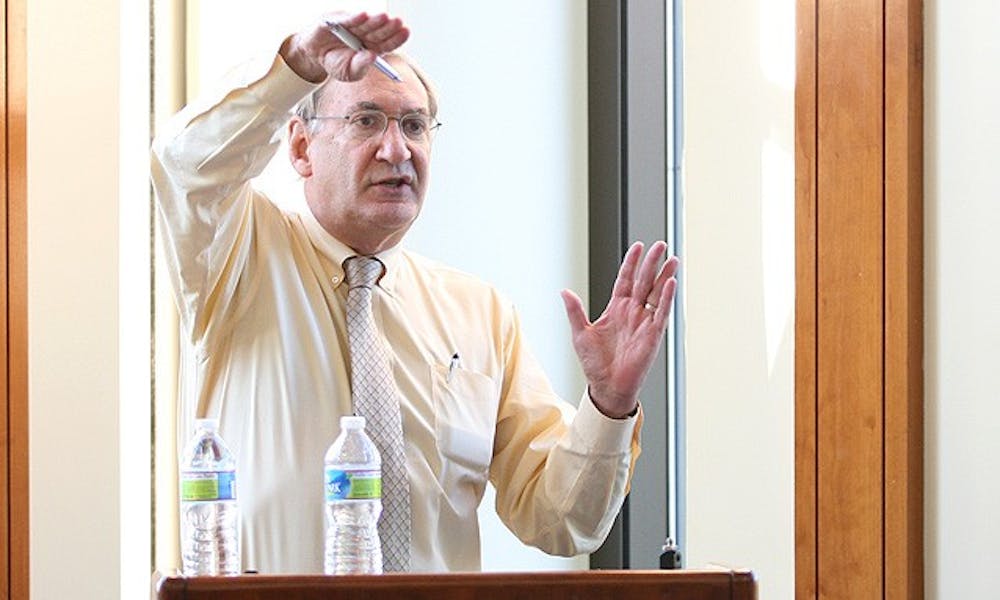Although the United States previously enacted strict rules about environmental protection, health and safety, the European Union is leading the game of precautionary regulations, said David Vogel, professor of political science and Solomon P. Lee chair in business ethics at the Haas School of Business at the University of California-Berkeley.
Vogel compared the international trends of regulatory change in the United States and the European Union at a forum Monday titled “The Politics of Precaution,” sponsored by the Sanford School of Public Policy and the Kenan Institute for Ethics. He said the American legislature tended to impose more stringent policies to prevent health and environmental risks than European countries in the 1960s through the 1980s—but the trend has reversed during the past twenty years.
“In [the 1960s through the 1980s] America had the highest standards of health and safety, but since 1990 there has been a dramatic shift,” Vogel said, “Europe has become more and more precautionary.”
For example, in late 1980s the United States actively restricted ozone pollution through legislation, but the attitude of the European Union was relatively ambivalent, he said. But now it is the European Union that is taking the lead in ozone regulations and America is less supportive of strong enforcement of ozone-related regulation. He added that the same phenomena can also be seen in food safety, chemical use and toy production.
“During the [the 1960s through the 1980s] we heard many critics saying that America used precautionary regulations as trade barriers,” Vogel said. “Now the direction of criticism is also reversed.”
Vogel attributed this reversed trend mainly to changing public opinion. When a potential risk is revealed, the American public want substantial proof that there is a risk, but European people prefer to push for immediate legal action.
“People in our country were responsive to the alarm bell, taking it seriously and pushing the government to take action, but now we become cautious and skeptical,” Vogel said.
He argued that in addition to changing public opinion, bipartisan dissonance in Washington, D.C. also contributed to the decrease in precautionary regulations in the United States.
“The Republicans become more conservative, which makes it harder for Congress to pass [precautionary] laws,” Vogel said. “In 1989 after the [Exxon Valdez] oil spill, Congress responded [with] bipartisan cooperation and passed a law that enormously increased the safety standard—but twenty years later after the Gulf of Mexico oil spill, Congress responded by doing nothing.”
Vogel also added that many scholars are beginning to believe that governments have made too many unnecessary regulations in the past.
“People began to think that the U.S. had made too many mistakes when approving the stringent laws driven by the public anxiety,” Vogel said. “They questioned whether it was responsible for the government to spend so much on preventing the risks which even might not be real.”
Vogel also made the point that even though the federal government became less active in precautionary regulations, the United States still experiences European Union-style protection against environmental and health risks through other mechanisms.
“The most important mechanism is the state governments,” Vogel said. “For example, the California legislature follows the guideline of the E.U. rigorously—if the E.U. changes its policy, the policy of California will automatically be changed.”
Corporations are another significant mechanism for ensuring safety, Vogel said. When corporations improve their products to meet the European Union’s requirements, they spontaneously offer less risky products to Americans.
“I’m not making a claim that it’s better to have stringent policies—it is only a matter of view,” Vogel said. “But I want to make it clear that we are now in the different direction than twenty years ago, and now Europe is doing what we had done.”
Shiri Cohen, a senior research fellow at the Center for the History of Political Economy, said the examples Vogel used made his point very persuasive.
“I think his speech was very clear,” Cohen said. “It was presented in a very good structure.”
Edward Balleisen, an associate professor of history, said there is still much to be debated around the issue, adding that there are additional sides to this topic.
“It is really an excellent general discussion about the essential policy-making issues,” Balleisen said. “He raised a big question not only concerned with the U.S. and the E.U., but also India, China, Latin America and all over the world.”
Get The Chronicle straight to your inbox
Signup for our weekly newsletter. Cancel at any time.

